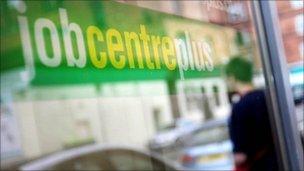Unemployment in Wales falls to lowest level in a year
- Published

The fall in the Wales jobless rate will raise recovery hopes
The number of jobless people in Wales has dropped to its lowest level in over a year.
The latest Labour Market figures show unemployment is currently at 118,000.
The unemployment rate in Wales now stands at 8.2%, compared with a UK average of 7.7%.
The drop was welcomed by Welsh Secretary Cheryl Gillan. It is the fourth consecutive month the overall figure has either fallen or remained the same.
The actual number of people claiming jobseekers' allowance in Wales in September rose slightly to 5.1% - 71,800 people.
Mrs Gillan said: "Not only has there been a fall in the unemployment rate in Wales but we have also seen an increase of 0.2% in the employment rate in Wales, now standing at 67.2%.
"However, despite the fall in unemployment we cannot be complacent.
"We will continue to work in partnership with the Welsh Assembly Government to bring more businesses to Wales and equip jobseekers with the skills needed to re-enter the workforce."
The overall economic picture of Wales is painted by the latest Labour market statistics compiled by the Office of National Statistics (ONS).
Economic inactivity levels are regarded by some analysts as a key indicator of the overall health of an economy.
In Wales 504,000 people, 36.6% of the potential working population, are recorded as economically inactive.
This is a rise of 8,000 or 0.4% on last quarter.
Deputy First Minister Ieuan Wyn Jones said: "Any increase in employment must be welcomed and these latest figures show the number of people in work in Wales has gone up by 12,000 over the previous quarter and 28,000 over the previous year.
"However, this is a fragile recovery and we must look at the long term. Only this week we have seen 300 jobs under threat at the Passport Office in Newport and 180 posts cut at Tata in Shotton.
"Price Waterhouse Coopers are today warning that UK Government spending plans could see 52,000 public and private sector jobs disappear in Wales.
He called on the UK government "to re-think their approach and not cut too deep and too soon and risk the slow progress we are making".
- Published12 October 2010
- Published12 October 2010
- Published15 September 2010
- Published14 July 2010